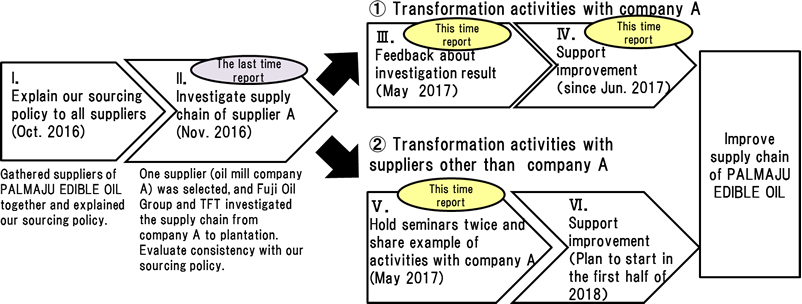News Release
News
FUJI OIL HOLDINGS
Progress report on responsible palm oil sourcing
2017.11.27
1. Purpose
Fuji Oil Group formulated and announced Responsible Palm Oil Sourcing Policy in March 2016. The Responsible Palm Oil Sourcing Policy commits itself to no deforestation, no peatland and no exploitation policy for all palm oil within our supply chain.
In this report, we will report the progress of initiatives to implement our sourcing policy since the previous report (May 2017).
2. Progress
(1)Traceability
Our Group is working to figure out traceability to grasp and improve the supply chain. We aim to achieve full traceability to oil mills for all palm oil purchased and processed across the Group by 2020.
We have achieved a global palm oil traceability score of 96% in the period from January 2017- June 2017. This refers to a global average of 96% for all Palm Oil (PO) and 97% Palm Kernel Oil (PKO) products.
Transition of traceability score to oil mills(%)
| January 2017 - June 2017 | July 2016 - December 2016 | January 2016 - June 2016 | |
|---|---|---|---|
| Palm Oil | 96 | 93 | 93 |
| Palm Kernel Oil | 97 | 96 | 98 |
| Total | 96 | 94 | 94 |
Although the score varies depending on each region, the Group as a whole improved compared with the previous reporting period (July 2016 - December 2016). This improvement is due to strengthened communication with suppliers, especially in Thailand and China. We will continue to strengthen engagement with suppliers who understand our sourcing policy and work hard to improve our score.
Note on results
- ・Traceability levels may vary over time due to data availability, changes in sourcing or other issues.
- ・All traceability numbers are based on self-disclosed information provided by our suppliers. In some cases, the GPS coordinates of mills were shared with our partner TFT and not directly with Fuji.
- ・This scoring includes products that are considered provisionally traceable. That is, where mill lists are available that do not include latitude and longitude coordinates.
- ・Some mill data is bound to NDA’s between TFT and our suppliers, while plans for Fuji Oil Group to hold this data are being developed.
(2)Supply chain improvement activities
ART (Aggregator Refinery Transformation) Plan
Since October 2016, we have worked with TFT (The Forest Trust) who is a NGO to implement an ART (Aggregator Refinery Transformation) plan for Crude Palm Oil (CPO) and Palm Kernel Oil (PKO) suppliers in the supply chain of PALMAJU EDIBLE OIL SDN BHD which isone of our group companies and one of 1st refineries in Malaysia.
This plan supports the transition of the business activities of PALMAJU EDIBLE OIL SDN BHD’s suppliers to follow our sourcing policy.

As shown in the above figure<1>, as of November 2017, we conduct two types of activities: "① Transformation activities with company A" and "② Transformation activities with suppliers other than company A"
① Transformation activities with company A
Transformation activities with company A has been achieved by closing the gap between the status of company A's supply chain and our sourcing policy. Moreover we carry out the activities with the aim of obtaining resources of knowledge such as the point where problems are likely to occur and the solution method according to reality in order to present the model of an exemplary oil mill to other suppliers. As a result of investigation on oil mill, plantations and smallholders on the supply chain of company A, we are in the process of improvement supports by visiting company A three times for a total of 11 days from June 2017 to November 2017. The following achievements have been made as a progress of improvement supports.
- ・Integrated No Exploitation Policy for company A developed – not yet adopted
- ・Company Grievance procedure adopted and implemented by company A
- ・Code of conduct for Labour Recruiter adopted and implemented by company A
- ・Passport return procedure for foreign workers adopted by company A
- ・All foreign and local workers of company A to hold a written employment contract by the end of the year 2017.
② Transformation activities with suppliers other than company A
Based on the knowledge and experience gained from transformation activities with company A, we share exemplary management of oil mills, plantations and smallholders with a wide range of suppliers. In May 2017, we held two seminars over 4 days for suppliers other than company A (oil mill). At the seminar, we explained our sourcing policy, environmental issues and human rights issues, and made requests to the suppliers. Almost all suppliers participated in the seminar and improved their understanding of NDPE (No Deforestation, No Peat, No Exploitation).
(3)Supporting smallholders
The challenge for palm oil smallholders is that sustainable farm management is difficult due to lack of available knowledge. Fuji Oil Group supports smallholders in Kinabatangan of Saba, Malaysia with Wild Asia who is a NGO and our supplier from January 2016. The term of our support activity for smallholders is due four years.
As a progress of this support activity, 55 farmers who we support acquired RSPO certification in May 2017.
We will continue the support with Wild Asia and our supplier.
3. Next steps
Together with our partner we are working on a plan to engage suppliers to understand our sourcing policy. The ART plan will be continued, and we plan to distribute 'Tools for information gathering, self-diagnosis and improvement' to the corresponded suppliers in the first half of 2018. We are also in the process of developing a grievance mechanism formulation as well, aiming to formulate it by the end of March 2018. Fuji Oil Group plans to update its public traceability report on a half-yearly basis. Our next progress report will be released in May 2018 along with our activities on palm oil sustainability.
End of report